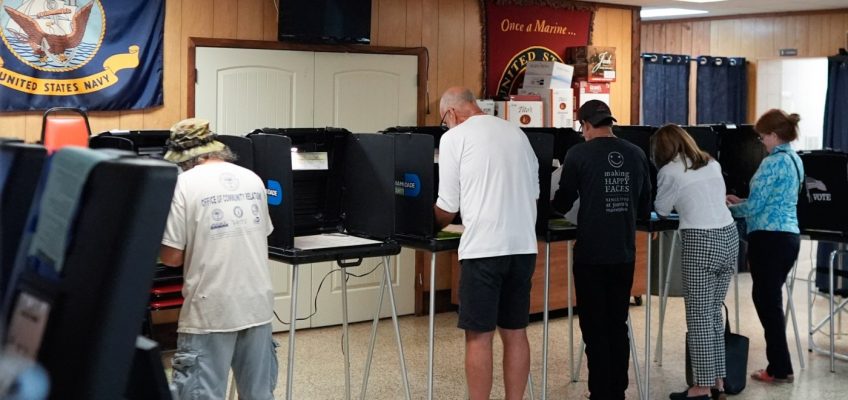According to City Hall, since rolling out new stricter re-sheltering rules for adult migrants without children in May, it’s assessed over 2,600 shelter extension cases, issuing over 850 approvals and over 1,780 denials.
Adi Talwar
Marcelo Canchingre, 37, from Ecuador, after applying for a shelter extension at the St. Brigid Reticketing Center in the East Village.
Emilio ate an apple outside the city’s “Reticketing Center,” at the former St. Brigid’s School in the East Village, where migrants can get a ticket to leave the city or reapply for an extension of their shelter stay.
Emilio, who asked that his full name not be used, was waiting near Tompkins Square Park for his friend, who like him hails from Ecuador. The two were visiting the Center to apply for more time in the shelter system; Emilio had been in the city since April, and was previously staying in a shelter in Midtown.
“They gave me 60 days,” Emilio, 39, said in Spanish, noting that he had recently applied for asylum with the federal government. He was assigned to two more months at the city’s large tent shelter for migrant adults at Randall’s Island.
A couple of hours after arriving, his friend, Marcelo Canchingre, 37, emerged from the former St. Brigid’s School with a strip of white paper with the address of a Long Island City shelter. Canchingre arrived in the city in November, and had been sleeping in a shelter in Flatbush until his time ran out. He was already working at a restaurant in Manhattan.
“Not bad. You’re only a few stops from Manhattan,” Emilio commented after looking at the address.
“They gave me 30 days,” Canchingre said, about the length of shelter stay he’d just received. Unlike Emilio, he has yet to apply for federal asylum.
It’s been several months since new rules went into effect for how migrants and asylum seekers can earn more time in the city’s shelters, based on their efforts to leave the system and often determined on a case-by-case basis. The city is now granting longer, 60-day extensions to those who fall into a category known as Permanently Residing Under the Color of Law (PRUCOL), meaning they’re eligible for certain public benefits.
As a result of a New York Office of Temporary and Disability Assistance guideline issued in May, migrants who have applied for Temporary Protected Status (TPS) or asylum—among other criteria—might be eligible for safety net assistance and state public benefits, such as temporary shelter.
The city has been granting additional shelter time for those with PURCOL status for months, but offering them longer, 60-day extensions, rather than 30 days as others have received, appears to be a more recent development, according to homeless advocates.
Adi Talwar
The entrance to the Reticketing Center at on 7th Streeet in the East Village, where migrants and asylum seekers can apply for more shelter time, or travel tickets to other locations.
The legal settlement that established the current rules for re-sheltering adult migrants without children, reached in March, specifies that those who meet the city’s varied criteria for more time after an initial stint must be offered at least another 30 days if the applicant is older than 23, and at least 60 days for those who are younger.
When asked when the city had initiated this change, City Hall stated that the longer extensions to migrants with PRUCOL status began after the settlement with the Legal Aid Society and Coalition for the Homeless was reached.
But according to Josh Goldfein, an attorney for the Legal Aid Society who negotiated the right-to-shelter settlement, this change was implemented recently.
He said the idea of granting more time to those who’ve applied for asylum was proposed to the city by advocates in the last month or so. Additional time will provide stability to asylum applicants while they wait to obtain a work permit, Goldfein said, which they can only do 150 days after filing.
“They [the city] told us that was their plan,” Goldfein said, “But this is the first time I’m hearing that they went ahead and actually implemented it.” The mayor’s office said it did not have figures to share when asked how many people had received 60-day extensions because of their PRUCOL status.
On the morning of Aug. 13 outside the Reticketing Center, City Limits spoke to nine migrants after they applied for a shelter extension. All eight who had filed an asylum application received two months in a replacement approval notice. The one who hadn’t submitted for asylum received a 30-day extension instead.
Adi Talwar
A window view of the Reticketing Center on Aug. 13.
Under the settlement reached in March, migrants applying for another bed after initial 30- or 60-day shelter stays could get extensions for “extenuating circumstances,” such as recovering from a medical procedure or if they have an upcoming immigration court date.
They could also earn more time if they show “significant efforts” to leave the system, such as applying for Temporary Protected Status—under which they can obtain work authorization—attending classes or securing a job, among other factors.
According to City Hall, since rolling out the new, stricter re-sheltering rules in May, it’s assessed over 2,600 shelter extension cases at the Reticketing Center, issuing over 850 approvals and over 1,780 denials.
The city wouldn’t detail how it weighs applications, but Goldfein said the 20-point system it began using this spring, in which someone can earn points for every effort they demonstrate to leave shelter, hasn’t changed.
“When people request extensions,” explained Dave Giffen, executive director at Coalition for the Homeless, “they are first screened for PRUCOL status, then if they do not have PRUCOL status, they can still request a shelter extension based on extenuating circumstances.”
When it was time to speak to a case manager inside the facility, migrants leaving the Reticketing Center that day reported being asked a few questions at most, while most said they were not asked any questions at all.
“We went in. We waited,” said Colombian Fernando Alemán, 23, in Spanish, who entered with a friend, and was given 60 more days at another shelter. “They didn’t ask us anything. They gave us the letter and the new address.”
Right: A man enters the Reticketing Center. Left: A prepackaged meal distributed to shelter applicants.
Photos by Adi Talwar.
Several, like Emilio, went out to eat the pre-packaged meals—consisting of an apple, boiled egg, and a bread roll—they had received inside.
More than 14,000 adult migrants without children remained in the city’s shelter system at the end of June, the most recent month for which population data is available. The stricter rules for shelter extensions over the last few months has resulted in more migrants sleeping and setting up camp outdoors, according to media reports, and city officials recently cleared one such encampment on Randall’s Island.
Another more than 51,000 people in shelter in June were migrant families with children, who aren’t subject to the tougher re-sheltering rules. But many families with children in the system have been issued 60-day shelter deadlines, at which point they must reapply for another placement. And this week, city officials confirmed that they will begin issuing two-month notices to migrant families with kids in Department of Homeless Services’ shelter sites, who until now had avoided the time limits.
Some 8,835 migrant families with children, or more than 30,000 people, were staying in DHS shelters at the end of June. Homeless and immigrant advocates have slammed the policy change, saying that forcing homeless children to move shelters every two months is disruptive to their routines and access to education, and comes just as the new school year is about to start.
More faith-based shelters to open
On the morning of Aug. 13, some asylum seekers came out of the Reticketing Center with optimism on their faces.
But others complained that they were assigned to shelters far from where they worked, or were assigned to one of the nine houses of worship across the city that have opened as part of the faith-based shelter program announced by the mayor last year.
Under the plan, 50 houses of worship were selected to provide overnight housing for more than a dozen adults per facility, but after more than a year, just nine are currently providing shelter for migrants.
Adi Talwar
Posters at the entrance to the Reticketing Center with options for overnight and daytime “hospital centers” where migrants and asylum seekers can stay.
Unlike other shelters the city has opened, the religious sites can take in far fewer people and only operate overnight.
“They open at 7 p.m., and you leave at 7 a.m.,” said a Haitian immigrant in French, who did not want to be identified by name but who said he was assigned to one such site.
Migrants and asylum seekers have the option of going to two “daytime hospitality centers,” which are open from 7 a.m. to 7 p.m. and provide food, showers, and clothing distribution.
According to Peter Gudaitis, executive director and CEO of New York Disaster Interfaith Services (NYDIS), two more faith-based shelters are supposed to open this month and over 20 more are working to open.
For months, the program has been stalled by the Fire Department’s approval process, including complying with rules around the number of beds, and a Department of Buildings (DOB) requirement to obtain a temporary use permit.
“All delays are still related to the FDNY and DOB code compliance for getting a Temporary Use Permit,” said Gudaitis.
To reach the reporter behind this story, contact Daniel@citylimits.org. To reach the editor, contact Jeanmarie@citylimits.org
Want to republish this story? Find City Limits’ reprint policy here.




